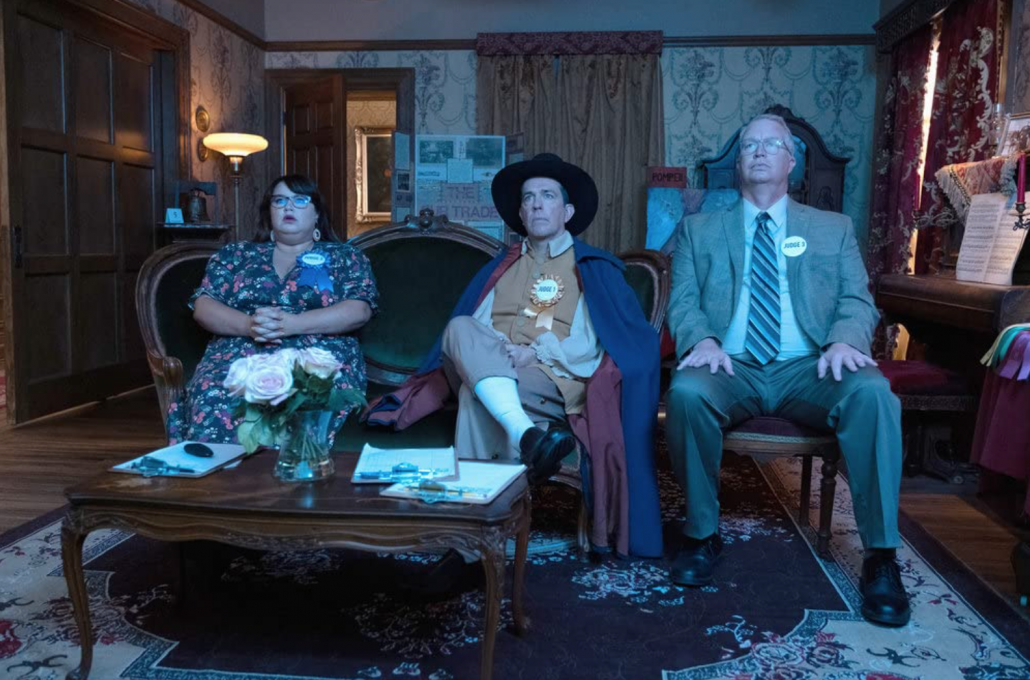REVIEW: ‘Rutherford Falls’ suffers from growing pains

The premise for Peacock’s new sitcom “Rutherford Falls,” which premiered on the streaming service April 22, sounds great: A descendent of a small town’s white founder is obsessed with preserving his family’s history, ignoring the history of the town’s Native American reservation. Throw in the lead actor and co-creator Ed Helms along with Sierra Teller Ornelas’ fresh voice and Michael Schur’s sitcom magic, and you have the makings of an instant hit.
Unfortunately, the first three episodes of the streaming series don’t totally live up to their potential. While the story brings a new refreshing perspective to television, it falls short of becoming a conversation-changer or a comedic hit.
“Rutherford Falls” follows the big-hearted yet stubborn Nathan Rutherford (played by Helms) after the town mayor (Dana L. Wilson) wants to move Big Larry, the statue of Nathan’s colonial ancestor, which sits directly in the middle of a town road.
He agrees at first, convinced by his best friend Reagan (Jana Schmieding) that it would stir up good will with the town’s citizens and bring in more business for his town history museum. When he learns that the people of Rutherford couldn’t care less about Big Larry, he vows to do everything in his power to keep it in its place.
Helms is funny and likable, keeping us from completely hating his character, but Nathan seems a bit out of place in his own story. He has good intentions and is not purposely insensitive, but he shouldn’t be allowed to be so out-of-touch. The creators’ choice with their protagonist is obviously deliberate, but it’s unclear why. Do we really still need an ignorant white man to be the catalyst for starting important conversations? No.
Schmieding plays the dynamic, loveable Reagan Wells, a member of the fictional Native Minishonka people who runs a cultural center attached to the Nation’s casino. However, it is often mistaken for a gift shop. Like Nathan, she’s more interested in her culture’s history than the actual people, and pretty much every other Minishonka individual hates her.
Reagan’s journey involves reckoning with her past, vying for an updated culture center from the tribal leader and her boss (Michael Greyeyes) and falling in love with the exciting out-of-town journalist (Dustin Milligan). Her storyline is much easier to invest in than Nathan’s barely noteworthy desire to keep his statue in place. The show would’ve been much better served if it focused on Reagan instead of easily throwing her aside in favor of Nathan’s funny but overdone temper tantrums.
It’s hard to find something to root for in the first few episodes. Reagan is interesting and Schmieding is impressive, but her story isn’t central or gripping enough to carry the show. We don’t want Nathan to win his ridiculous fight, but he isn’t showing any signs of being open to learning or growing. Terry, the Minishonka leader, is portrayed as the show’s antagonist, a capitalistic shark who decides to sue Nathan in the second episode. However, he seems like more of a good guy in the culture clash with Nathan, leaving the audience with nothing that really draws us in.
“Rutherford Falls” also falls short in terms of comedy. The actors are all impressive and the writing is pleasant, but the jokes are often predictable and underwhelming. The lack of an engaging plot could be compensated for by insanely funny characters, as we’ve seen with some of Schur’s hits like “The Office.” There are moments of wit and hilarity in this show, but it does a better job of reaching for laughs than delivering them.
The show’s strength comes from bringing up the conversation about Indigenous history. With five Indigenous writers, the show provides new perspectives and lets the characters be real people instead of using them solely for a political agenda. The authentic Native American experience is something too often left out of mainstream entertainment, and “Rutherford Falls” creates a non-judgemental space for audiences to confront this.
Overall, “Rutherford Falls” is, like its protagonist, well-intentioned but a little misguided. It has the recipe of a great show, so perhaps it just needs a little more time to get there. It’s a charming and light-hearted way to present important topics, but it has trouble balancing its roles as both a conversation-starter and a sitcom.

